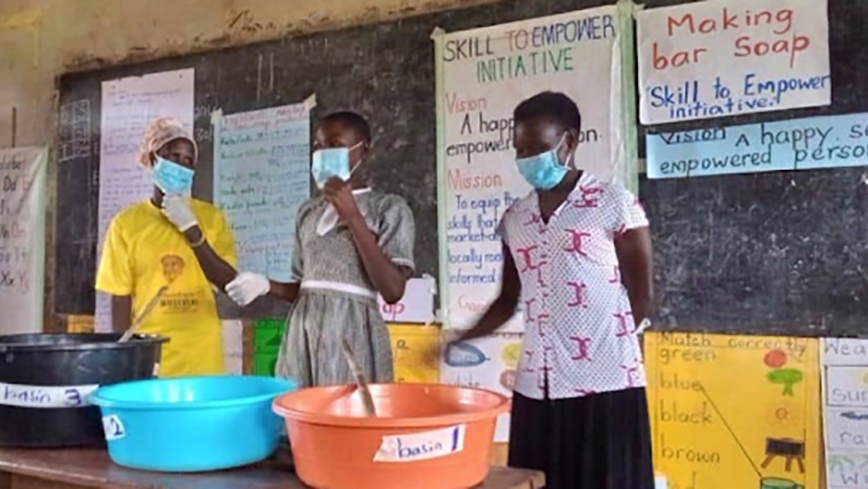Empowering families and students through entrepreneurial skills training in rural Uganda

During my Teach for Uganda fellowship, I noticed that some of my students’ parents were struggling financially to support their children' education. They were unable to pay the exam fee charged per term (equivalent to about one US dollar) and could not always afford to purchase school meals or materials for their children. Sometimes, these financial considerations prevented students from attending school regularly, which greatly impacted their learning.
I joined together with three other Teach For Uganda fellows who’d also noticed similar struggles among the parents of their students and together we founded the Skill to Empower Initiative, which equips school children, youth, and women with practical skills in making market-driven products, such as bar and liquid soap, petroleum jelly, shampoo, paper bags, and school chalk, among others. Once the products made are sold, 90% of the revenue is invested back to increase production and the remaining 10% is saved in a group savings association that provides members with quick and affordable credit to meet their expenses, with priority given to school related expenses. Our goal is to economically empower women and youth so that they can participate in the social and economic development of their communities, and to empower parents to support their children's education financially.
Through the Skill to Empower Initiative, families, community members, and children have developed skills in teamwork and collaboration, time management, and patience, especially when making bar soap which takes a long time to set. They have also developed self-confidence in their ability to follow instructions carefully and learn new skills. Making the products also serves as an opportunity for learners to develop critical thinking skills as they experiment and explore how to customize the colors and perfumes in the soaps and shampoos, as well as improving their spatial reasoning through the steps that go into making the products such as sorting, organizing, and arranging different ingredients.
Since the Initiative's inception in September 2022, we have trained over 200 school children, 150 women, and 38 teachers in four schools and villages in Mayuge district. To ensure the sustainability of the program, we encourage and support the formation of enterprise groups where community members come together and use the skills they’ve learned to begin mass production. By the end of 2022, we had overseen the formation of a women's enterprise group in Buswikira village, which has 25 members. Through selling the products they’ve made with the help of our project, many parents are now able to more comfortably and consistently afford to buy scholastic materials for their children, which has led to improved school attendance, especially in Buswikira, Nawandegeyi, and Magunga Primary Schools.
Recently, the Skill to Empower Initiative was registered as a Community-Based Organization and issued an operational permit to operate in Uganda. We are so excited about this development and encouraged to continue to grow our reach in working with and equipping students and families with valuable skills and knowledge for personal and community development. Our future plans involve scaling our projects to more schools and communities, and recruiting and training approximately 15 community-based volunteers who will act as our focal persons in the communities. They will also be the lead trainers in those communities in order to help ensure the sustainability of these projects. We also plan to introduce more skills training in motorcycle and phone repairs since there are currently no people offering these services professionally in the communities where we work, despite the great demand for these services.
Our hope is that this program can continue to foster entrepreneurial skills, increase school attendance as well as allowing our students to learn alongside their parents and get a real understanding of how the skills they learn can be applied.
Click here to learn more about how our network is supporting students and communities so they are prepared to thrive in the future of work.



